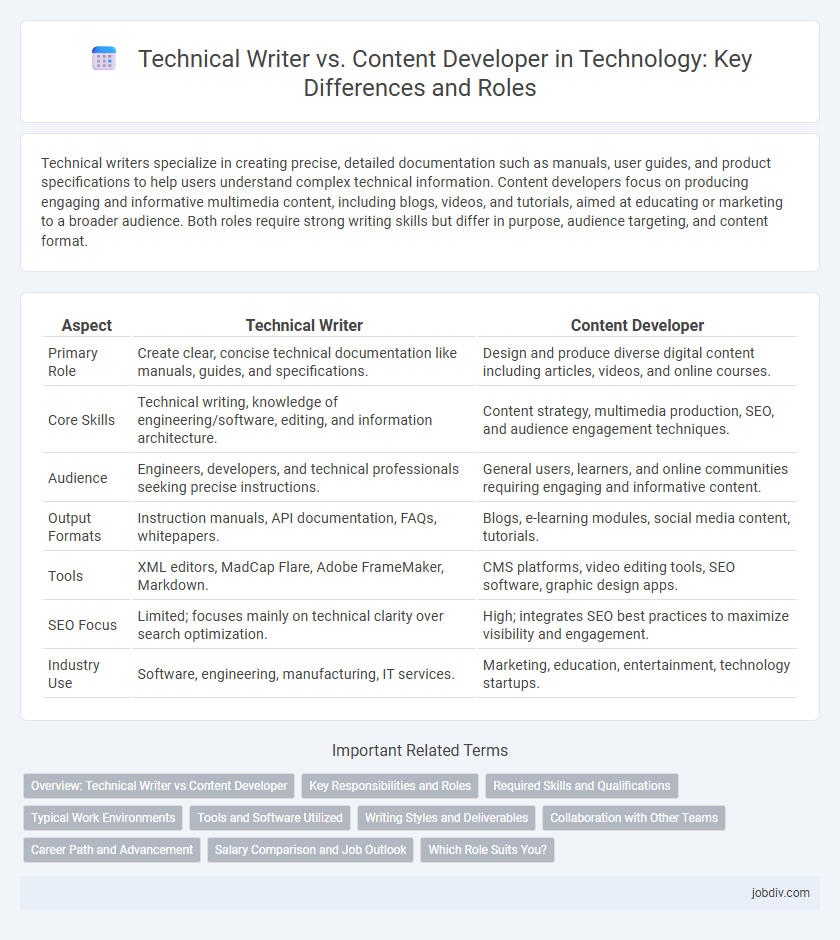Technical writers specialize in creating precise, detailed documentation such as manuals, user guides, and product specifications to help users understand complex technical information. Content developers focus on producing engaging and informative multimedia content, including blogs, videos, and tutorials, aimed at educating or marketing to a broader audience. Both roles require strong writing skills but differ in purpose, audience targeting, and content format.
Table of Comparison
| Aspect | Technical Writer | Content Developer |
|---|---|---|
| Primary Role | Create clear, concise technical documentation like manuals, guides, and specifications. | Design and produce diverse digital content including articles, videos, and online courses. |
| Core Skills | Technical writing, knowledge of engineering/software, editing, and information architecture. | Content strategy, multimedia production, SEO, and audience engagement techniques. |
| Audience | Engineers, developers, and technical professionals seeking precise instructions. | General users, learners, and online communities requiring engaging and informative content. |
| Output Formats | Instruction manuals, API documentation, FAQs, whitepapers. | Blogs, e-learning modules, social media content, tutorials. |
| Tools | XML editors, MadCap Flare, Adobe FrameMaker, Markdown. | CMS platforms, video editing tools, SEO software, graphic design apps. |
| SEO Focus | Limited; focuses mainly on technical clarity over search optimization. | High; integrates SEO best practices to maximize visibility and engagement. |
| Industry Use | Software, engineering, manufacturing, IT services. | Marketing, education, entertainment, technology startups. |
Overview: Technical Writer vs Content Developer
Technical writers specialize in creating clear, concise documentation such as user manuals, product guides, and technical specifications that simplify complex information for target audiences. Content developers focus on producing diverse digital content, including blog posts, videos, and social media materials, to engage and educate users while supporting marketing strategies. Both roles demand strong communication skills but differ in purpose, with technical writers emphasizing accuracy and clarity, and content developers prioritizing audience engagement and multimedia versatility.
Key Responsibilities and Roles
Technical Writers specialize in creating clear, concise documentation such as manuals, product guides, and technical specifications to help users understand complex technologies. Content Developers design, develop, and manage digital content strategies, often producing multimedia content, blog posts, and interactive materials to engage target audiences. Both roles require strong communication skills, but Technical Writers focus on accuracy and clarity of technical information, while Content Developers prioritize audience engagement and content creativity.
Required Skills and Qualifications
Technical Writers require strong proficiency in technical knowledge, excellent writing skills, and the ability to translate complex information into clear, concise documentation. Content Developers need expertise in content strategy, SEO, multimedia creation, and adaptability to various digital platforms. Both roles benefit from familiarity with tools like Markdown, CMS, and version control systems, while Technical Writers emphasize precision in manuals, and Content Developers prioritize engaging, audience-focused materials.
Typical Work Environments
Technical writers typically work in structured corporate settings such as software companies, engineering firms, or manufacturing plants, where precise documentation and compliance are crucial. Content developers often operate in more diverse environments including digital marketing agencies, e-learning platforms, and media companies, focusing on creating engaging multimedia content tailored to target audiences. Both roles increasingly rely on remote collaboration tools due to the rising trend of telecommuting in the technology sector.
Tools and Software Utilized
Technical writers primarily utilize tools like MadCap Flare, Adobe FrameMaker, and Microsoft Word for creating structured documentation, while content developers favor platforms such as WordPress, Drupal, and Adobe Creative Suite to produce diverse multimedia content. Both roles frequently employ collaboration software like Jira, Confluence, and Google Workspace to streamline project management and version control. Proficiency in markup languages like HTML, XML, and Markdown is essential across both professions to enhance content formatting and interoperability.
Writing Styles and Deliverables
Technical Writers specialize in creating clear, concise documentation such as user manuals, technical guides, and specifications, emphasizing structured and precise language to convey complex information effectively. Content Developers focus on crafting diverse digital content including blog posts, tutorials, and multimedia scripts, adapting tone and style to engage various audiences and platforms. Deliverables from Technical Writers prioritize accuracy and usability for technical audiences, while Content Developers aim for engaging and accessible materials that enhance user experience and brand communication.
Collaboration with Other Teams
Technical writers collaborate closely with engineering, product management, and quality assurance teams to create precise and accurate documentation tailored to technical audiences. Content developers work with marketing, design, and sales departments to produce engaging and user-friendly materials that support brand messaging and customer engagement. Both roles rely on cross-functional communication but differ in the focus and style of their collaborative outputs.
Career Path and Advancement
Technical Writers typically advance by gaining expertise in specialized industries such as software, engineering, or healthcare, moving into roles like documentation manager or information architect. Content Developers often progress through skills in digital marketing, SEO, and multimedia content creation, advancing toward positions like content strategist or digital marketing manager. Both career paths benefit from continuous learning and adapting to new technologies to enhance communication effectiveness and user engagement.
Salary Comparison and Job Outlook
Technical writers earn an average salary ranging from $60,000 to $85,000 annually, while content developers typically make between $55,000 and $80,000. The job outlook for technical writers is projected to grow 7% through 2030, driven by increasing demand for clear documentation in IT and software industries. Content developers face a slightly faster growth rate of 8%, fueled by expanding digital marketing and multimedia content creation needs.
Which Role Suits You?
Technical writers excel in creating clear, precise documentation like manuals and product guides, ideal for individuals who enjoy detailed, structured communication and translating complex technical information into easy-to-understand formats. Content developers focus on crafting engaging, multimedia content such as blogs, videos, and social media posts, suited for those who prefer creativity and audience engagement across diverse platforms. Choosing the right role depends on your strengths in communication style, technical expertise, and preference for either structured documentation or dynamic content creation.
Technical Writer vs Content Developer Infographic

 jobdiv.com
jobdiv.com